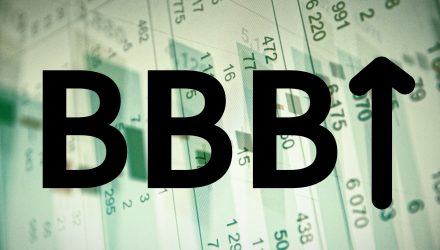Summer volatility spurred activity in the bond markets, but BBB bonds, the lowest of investment-grade bonds, is one looming risk that could still linger in 2020 or could it?
BBB bonds comprise almost 50% of the investment-grade bond market and a lack of liquidity could leave BBB bond investors holding the debt as it toes the line between investment grade and junk bond status–the worry, of course, being that it may eventually fall into the category of the latter.
“There still are a large portion of the investment grade universe that’s triple-B rated. The difference between where we were a year ago is we’ve seen more commitment from management teams to actively deleverage the balance sheet,” said Jon Duensing, director of investment grade corporates at Amundi Pioneer. “If you look a where spreads are now relative to long term averages, they’re certainly inside of long term averages. You could point to decent economic conditions, very supportive monetary policy positions from the U.S. central bank and supportive demand from non-U.S. business investors. A lot of that is priced in.”
Other market experts, however, see improving debt conditions in 2020.
“We expect credit metrics will continue to improve in 2020, with the majority of the top 10 maintaining relatively stable metrics and a few achieving more notable improvements,” S&P analysts wrote. “We expect leverage to decline at General Electric, CVS Health, and United Technologies in 2020, largely as a result of asset sales, continued debt repayment, and an all-stock merger, respectively.”
Investment-Grade Debt ETFs
Investment-grade corporate bond-focused fixed-income ETF options include the iShares Intermediate Credit Bond ETF (NASDAQ: CIU), iShares iBoxx $ Investment Grade Corp Bond ETF (NYSEArca: LQD) and Vanguard Interm-Term Corp Bond ETF (NASDAQ: VCIT).
CIU tracks the investment results of the Bloomberg Barclays U.S. Intermediate Credit Bond Index. CIU focuses on investment-grade corporate debt and sovereign, supranational, local authority and non-U.S. agency bonds that are U.S. dollar-denominated and have a remaining maturity of greater than one year and less than or equal to ten years.
LQD seeks to track the investment results of the Markit iBoxx® USD Liquid Investment Grade Index composed of U.S. dollar-denominated, investment-grade corporate bonds. LQD allocates 95 percent of its total assets in investment-grade corporate bonds to mitigate credit risk.
VCIT seeks to track the performance of a market-weighted corporate bond index with an intermediate-term dollar-weighted average maturity, namely the Bloomberg Barclays U.S. 5-10 Year Corporate Bond Index. While VCIT holds debt issues with maturities between 5 and 10 years, they are all investment-grade holdings to minimize default risk.
For more trends in fixed income, visit the Fixed Income Channel.

